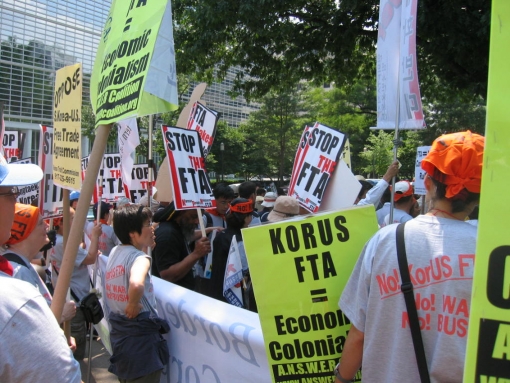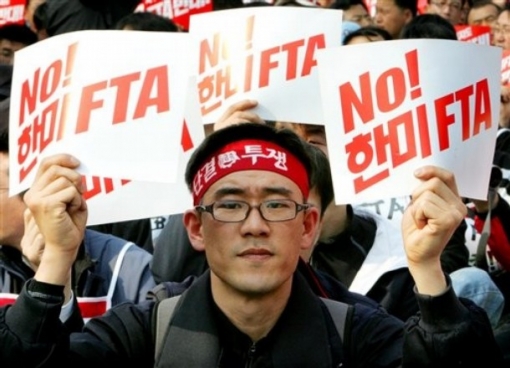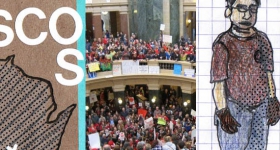On Wednesday in Seoul, Korean President Lee Myung Bak welcomed a top-level American delegation. They met to discuss the US-Korea Free Trade Agreement (KORUS), which, having languished since negotiations in 2007, is now endorsed by President Obama and up for Congressional ratification. While American media scarcely covered this week’s events, Korean newspapers were saturated with reports, speculations, and photographs. In one image, President Lee stands beside another man of Asian descent: Gary Locke, the Chinese American Commerce Secretary and soon-to-be Ambassador to China.
Locke is our diasporic politician par excellence. In this Chinese Age, President Obama has masterfully deployed Locke’s Asian (American) street cred in the service of American commerce and East Asian foreign policy. Obama's nomination of Locke for the ambassadorship demonstrates a keen understanding of immigrant identities and how they play into international politics.
Diasporic impacts are no secret, as the capital D diaspora -- that is, the Jewish-American one -- has taught us. But as other immigrant populations gain political clout, these diasporas will be pushed and pulled in the same ways, if not always with the same fervor, as American Jews at the hands of the US and Israel. In the past few months, as concerns KORUS, Korean Americans have become just such a target.

The Capitol Hill outlet Roll Call has reported on the Korean government’s recent use of a public relations firm to create pro-KORUS advertisements aimed at Korean Americans. The promotional website koreauspartnership caters to this bicultural diaspora, grounding KORUS in the following version of history:
The US-Korea relationship began with the signing of the Treaty of Amity and Commerce in 1882. It was Korea’s first treaty with a Western nation. Korea chose to sign it because it viewed the US as the most fair-minded country in the world. This image still remains in the minds and hearts of the Korean people. . . .
After the ashes of the Korean War settled in 1953, the U.S. began helping Korea redevelop its economy through low-interest loans, investment, and broad-based security measures, such as the Mutual Defense Treaty of 1953. . . .
The KORUS FTA will strengthen Korea’s longstanding security and economic relationship with the US and serve as a pillar for the alliance in the 21st century. Its impact will go far beyond bilateral commercial benefits, such as trade growth and job creation. It will unleash new dynamics in the geostrategic landscape on the Korean peninsula and beyond.
On this arcadian scene, war, colonialism, and other calamities appear as mere blips on a steady parallel march toward free trade. This is predictably the view of KORUS supporters like the conservative Heritage Foundation and transnational corporations. Most trade unions in the US and Korea, left-leaning policy organizations like Public Citizen, and farmworker groups (remember Korean beef?) oppose the pact.
Korean Americans, for and against, substantially overlap with these alignments. So what then are the functions of diasporic engagement? Why are Korean Americans the subject of targeted pro-KORUS public-relations campaigns and anti-KORUS organizing initiatives?

The first response is obvious: for a document-cum-process as incomprehensible and technocratic as a free trade agreement, any glimmer of interest is worth pursuing, and it is assumed that Korean Americans will be more inclined to care about KORUS ratification. A second, related point: Korean Americans may bring nuances to the analysis because of their connections on the ground. In contrast to a prototypical (white) “American,” a Korean American may consider trade effects on both Korean and American workers and be mindful of reunification politics, a more or less useful orientation depending on one’s perspective. Third, Korean Americans are of strategic importance to both KORUS camps as a legitimating, authenticating sign. In a US Chamber of Commerce video promoting KORUS, a bilingual Korean American businessman with a plant in Cedar Rapids becomes the quintessential spokesman for free trade, à la Gary Locke.
My personal opposition to KORUS is shaped less by Korean Americanness than my experiences with workers’ rights and global trade. The slogan ‘free trade is never free (or fair)’ has borne itself out in previous free-trade agreements, and I see no indication that KORUS (or its companion Colombia and Panama agreements, which are also up for ratification) will be different.
Any discussion of free trade relates back to the North American Free Trade Agreement (NAFTA), which, since its ratification in 1994, has been the model for multinational trade liberalization. In that earlier period of manufacturing decline, NAFTA promised to create thousands of US jobs by eliminating tariffs and other barriers to trade between and among the US, Canada, and Mexico. Excepting the truest of believers, most agree NAFTA has failed to deliver. Its riches have redounded to North America’s corporations and elites at the expense of American and Canadian manufacturing and Mexican agriculture.
With NAFTA in mind and building on previous critiques, I emphasize the following pitfalls of KORUS through a critical, Korean American lens:
1) KORUS falsely represents Korea’s rise and the calibration of US-Korea relations.
Like the ubiquitous Samsung flat-screen, KORUS presents as a salve for Korean America’s residual, 20th-century han. It portends a Korea nearly equal to the US, its postwar master. Yet such calibration under KORUS would only mean a sinking seesaw: the two countries facing a comparably bad fate.
First, KORUS’s lifting of trade barriers would apply to “American” and “Korean” goods that contain as little as 35% US- or Korea-originating content. (The European Union’s FTA with Korea requires a minimum of 45% EU or Korean content to qualify.) This would leave plenty of room for offshoring and outsourcing to China and other low-cost production sites, chipping off proportional numbers of US and Korean jobs.
Second, in many sectors, KORUS would do nothing for national parity. As Korean activists and Korean American groups like the Korea Policy Institute and Korean Americans for Fair Trade have long maintained, unmediated access to Korean markets would mean massive job losses for Korean farmers and healthcare workers, as these sectors are heavily subsidized in the US. From a certain standpoint, “free trade” in this vein resembles neocolonial economics, transforming Korean American han into ressentiment.

2) “Free trade” capitalizes on binational fantasies of wealth and security.
For Korean Americans who wave two flags at the Olympics, KORUS suggests a mutual, utopian flourishing. But in reality trade has uneven effects, and this species of "free trade" favors not the people of Korea or the US but the giant multinational` corporations seeking to expand their markets. There is little evidence KORUS would "create" jobs on a large scale in either country. An independent arm of the US International Trade Commission recently found that the agreement would in fact cause harm to the US auto industry, calling into further question United Auto Workers' endorsement of KORUS.
The prioritization of corporations over people is clear from the deregulation and service-sector liberalization that figure prominently in the agreement. These policies seem ahistorical in the wake of 2008’s financial crisis; yet they are prime selling points for financial, broadcasting, and health-services firms doing business on both shores of the Pacific.
Furthermore, the dispute-resolution mechanism under KORUS, just as under NAFTA, is good for corporations but bad for Korea and the US. The “investor-state dispute” arbitration (ISD) process is a key feature. Simply put, it permits a corporation facing alleged trade “barriers” -- often in the form of workers’ rights laws, food safety regulations, or environmental protections -- to sue either nation in arbitration tribunals. (Instructively, the EU-Korea FTA does not include an ISD procedure.) This provision is damaging not only to ordinary citizens but to state sovereignty as well.
Finally, American and Korean officials are billing KORUS as a fortifying measure, impliedly a bulwark against North Korean aggression. For moderate and right-leaning Korean Americans, this is an appealing connection. At a March conference convened by the National Bureau of Asian Research, US Trade Representative Ron Kirk indicated the need for “trade and economic integration across the Asia-Pacific” in the face of security threats. However, Public Citizen has argued that trade under KORUS (due to the low 35% rule-of-origin standard discussed above) could lead to expanded consumption of products manufactured in North Korea’s Kaesong Industrial Park, an exploitative commercial venture operated by both Koreas. Thus, for those alarmed by a well-resourced, bellicose North Korea, KORUS provides no real answer. Nor does it do anything for reunification efforts; a further closing of ranks between the U.S. and the South will do little to open up Kim Jong-Il’s regime.
* * *
Among Korean Americans, KORUS mirrors other diasporic debates -- over North Korean politics, transnational adoption, and US military bases. Liberal Korean Americans generally oppose “free trade,” sanctions against North Korea, mass overseas adoption, and the continuation of the US military presence on the Korean peninsula. Republican or conservative members of the diaspora are diametric to these positions. On the whole Korean America tips conservative, for cultural and sociopolitical reasons I have previously examined.
In the current politicking of KORUS, Korean Americans have a unique opportunity to wield diasporic influence. With Congress gearing up to debate ratification, it will matter whether we converse with friends and electeds, and it will matter what we say. Let us make good use of our diasporic position and not be used to advertise the fantasies of free trade.










Comments
Thanks for your comment.
Your view of what's political seems to be quite narrow, which Hyphen is not. You are certainly entitled to your opinion, though, which is a personal one--as all opinions are. And any opinion piece is inherently "biased."
If you have substantive arguments to make, you should feel free. But simply because a view doesn't accord with yours doesn't make it "poorly researched," and the 'Korea is not Mexico or Canada' line of reasoning isn't very compelling. Strong labor unions and environmental policies are also true of Canada, to be sure, and the key point is that ISDs and other fundamentally detrimental features of NAFTA are now in all bilateral and multilateral FTAs.
But do engage other people in these debates--the conversation is certainly worth having.
Hi, Ed.
We appreciate your engaged debate, and certainly your concern for Hyphen's journalistic voice. It is, however, important to note that this piece is part of a column for Hyphen's *blog,* and so a different kind of writing, actually, than the reporting you have in mind. It is an editorial space (as in, 'editorialize'), where arguing a particular analysis or opinion is by definition the function of the piece.
Not only is it well within Tammy's parameters not to pretend to objectivity here, but such is the nature of this subset of journalistic writing. Google 'Editorial' and 'New York Times' or 'LA Times' if you like; it'll take you to what's called the Opinion Pages. There is an important place for this in journalism.
Best,
erin, blog editor